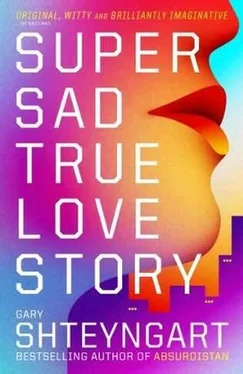I don’t know what’s going on. The city is either completely finished or already shooting for redemption. New signs are going up. “Tourism NYC: Are YOU Rupture-Ready?” and “New York Cit-ay Edge: Do U Have What It Takes 2 Survive?”
As far as I can tell, the most significant forms of employment around Manhattan are the “Staatling-Wapachung Works Progress” sites promising “One hour honest labor = 5-jiao coin. Nutritious lunch served.” Rows of men cracking open asphalt, digging ditches, filling in ditches with cement. These five-jiao men roam the city, hands in pockets, useless vestigial äppäräti plugs in their ears, like a pride of voiceless lions. They’re middle-aged to younger, sparse hair bleached by the sun, tyrannical sunburns on their face and neck, expensive T-shirts bought in happier days, new Antarcticas of perspiration spreading down to the stomach. Shovels, picks, loud exhalations, not even grunts anymore, to save energy. I saw Noah’s old friend Hartford Brown, who only a few months ago was getting reamed on a yacht in the Antilles, working a five-jiao line on Prince Street. He looked cracked, half of him bronzed, the other half peeling, that slightly pudgy face of his devoid of all texture, like a thick slice of prosciutto. If they can make a fabulous gay man work like that, I thought, what can they do to the rest of us?
I went up close to him as he swung his pick, felt his rank odor battering its way into my nostrils. “Hartford,” I said. “It’s Lenny Abramov. Noah’s friend.” A terrible exhale from a terrible place inside him. “Hartford!” He turned away. Someone with a megaphone was yelling, “Let’s do get back to work, Brownie!” I handed him a hundred-yuan note, which he accepted, also without thanks, and then he went back to swinging his pick. “Hartford,” I said. “Hey! You don’t have to work now. A hundred yuan is two hundred hours of work. Take it easy. Get some rest. Get some shade.” But he just went on swinging mechanically, avoiding my presence, already back into his world, which began with the pick behind his shoulder and ended with the pick in the ground.
Back home, Eunice took charge of organizing the relief efforts for the older people. I don’t know why. The stirrings of her Christian background? Sorrow over not being able to help her own parents? I’m just going to take it at face value.
She went from floor to floor in each of our four co-op buildings, a total of eighty floors, knocked on each door, and if there were older people she took down their food and water needs and made sure the supplies were brought down the next week in one of Joshie’s Staatling-Wapachung Service convoys. Why is he helping us? I suppose he feels guilty about Noah and the ferry, or maybe about The Slap. In any case, we need what he’s got.
She delivered the water herself-with my sporadic help-to each apartment, she made sure all the windows and doors were open to improve circulation, she sat there and listened to the old people cry about their children and grandchildren who were scattered around the country and for whom they feared the worst, she asked me to interpret certain Yiddish words (“that farkakteh Rubenstein,” “that shlemiel Rubenstein,” “that little pisher Rubenstein”), but mostly she sat with them and hugged them as their tears pollinated the dusty throw rugs and embattled last-century carpets. When the older women (most of our aged residents are widows) smelled particularly bad, she would clean their dirty bathtubs, help the shaky old ladies inside, and wash them. It was a task I found particularly repulsive-how I feared one day having to care for my parents in so thoughtful and tactile a manner, as Russian tradition expected of me-but Eunice, who despised any alien smell coming from our refrigerator or the rankness of my toenails after several missed pedicures, did not flinch, did not turn away from the sunken, splotched flesh in her hands.
We saw a woman die. Or Eunice did anyway. I think it was a stroke. She couldn’t get the words out of her mouth, this withered creature, sitting beside a coffee table littered with unusable remote controls, a photo of the Lubavitcher Rebbe showing off his beautiful beard framed behind her. “Aican,” she kept saying, arcing spittle across Eunice’s shoulders. And then, more emphatically: “Aican, aican, aican!”
Did she mean to say, “I can”? I left the apartment, because I couldn’t bear to rekindle the memories of my own grandmother after her final stroke, in a wheelchair, covering up the dead parts of her body with her shawl, worried about looking helpless in front of the world.
I feared the old people, feared their mortality, but the more I did so, the more I fell in love with Eunice Park. I fell for her as hopelessly and thoroughly as I had in Rome, where I had confused her for a different, stronger person. My problem was that I couldn’t help her find her parents and sister. Even with my Staatling connections, I couldn’t find out what had happened to her family in Fort Lee. One day Eunice told me she could feel that they were still alive and doing well-a sentiment that floored me with its almost religious naïveté, but also made me wish I could believe the same thing about the Abramovs.
Aican, aican, aican.
So many things have happened since I’ve last written in you, diary, some of them awful, most of them mundane. I guess the main thing I can think of is the fact that things are getting better with Eunice, that through our mutual depression over what’s happened to our city, our friends, and our lives we’ve become closer. Because we can’t connect to our äppäräti, we’re learning to turn to each other.
Once, after a long weekend of scrubbing and watering our elderly, she even asked me to read to her.
I went over to my Wall of Books and picked up Kundera’s The Unbearable Lightness of Being , whose cover I had caught Eunice examining once before, tracing with her finger the depicted bowler hat flying over the Prague skyline. There were laudatory quotes for the author and his work on the first page of the book from The New Yorker, The Washington Post, The New York Times (the real Times , not the Lifestyle Times ), even something called Commonweal . What had happened to all these publications? I remember reading the Times in the subway, folding it awkwardly while leaning against the door, caught up in the words, worried about crashing to the floor or tripping over some lightly clad beauty (there was always at least one), but even more afraid to lose the thread of the article in front of me, my spine banging against the train door, the clatter and drone of the massive machine around me, and me, with my words, brilliantly alone.
Reading Kundera’s book, I felt a growing anxiety as the words on the crinkly yellow pages came out of my mouth. I found myself struggling for breath. I had read this book many times over as a teenager, had bent the topmost edges of many pages where Kundera’s philosophy touched my own. But now even I had trouble understanding all the concepts, never mind what Eunice could understand. The Unbearable Lightness of Being was a novel of ideas set in a country that meant nothing to her, set in a time-the Soviet invasion of Czechoslovakia in 1968-that might as well not have existed as far as Eunice was concerned. She had learned to love Italy, but that was a far more digestible, stylish land, a country of Images.
In the first few pages, Kundera discusses several abstract historical figures: Robespierre, Nietzsche, Hitler. For Eunice’s sake, I wanted him to get to the plot, to introduce actual “living” characters-I recalled this was a love story-and to leave the world of ideas behind. Here we were, two people lying in bed, Eunice’s worried head propped on my collarbone, and I wanted us to feel something in common. I wanted this complex language, this surge of intellect, to be processed into love. Isn’t that how they used to do it a century ago, people reading poetry to one another?
Читать дальше












